Computer-mediated Learner Corpus Research and the Data-driven Teaching of L2 Pragmatic Competence: The Case of German Modal Particles
CALPER Working Paper Series, No. 4
The authors report on a three-week pedagogical intervention for the teaching of German modal particles, which draws on the methodologies of contrastive learner corpus analysis and data-driven learning. The intervention was administered in the context of a German-American telecollaborative partnership, an electronically mediated learning configuration in which geographically dispersed learners in parallel language classes use Internet communication tools in order to interact with one another on the completion of a variety of teacher-guided projects.
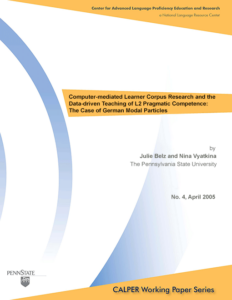
Publication Units:
Computer-mediated Learner Corpus Research and the Data-driven Teaching of L2 Pragmatic Competence: The Case of German Modal Particles
Publication Files:
Concept-based Instruction: Teaching Grammar in an Intermediate-Advanced Spanish L2 University Classroom
CALPER Working Paper Series, No. 3
This working paper focuses on the quality of the grammatical knowledge that is presented to learners in the classroom setting and how teachers can promote the appropriation of such knowledge by students. The approach proposed by the authors is predicated on the Vygotskyan principle that schooled instruction is about learners’ internalizing and developing control over theoretical concepts that are explicitly and coherently presented to them.
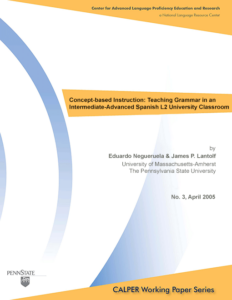
Publication Units:
Concept-based Instruction: Teaching Grammar in an Intermediate-Advanced Spanish L2 University Classroom
Publication Files:
Dynamic Assessment and the Problem of Validity in the L2 Classroom
CALPER Working Paper Series, No. 10
This paper begins with the premise that classroom-based assessment often carries high stakes for teachers and learners but that the important matter of validating these assessments has not been fully addressed in the literature. The author argues that the work of L.S. Vygotsky and his colleagues, through the dynamic model of assessment, offers a principled approach to integrating teaching and assessment as well as a theoretical framework for reflections on the validity of this activity.
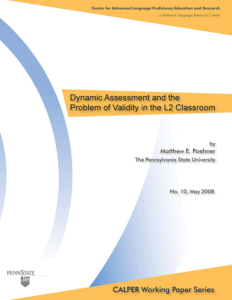
Publication Units:
Dynamic Assessment and the Problem of Validity in the L2 Classroom
Publication Files:
Dynamic Assessment of L2 Development
CALPER Working Paper Series, No. 1
The present paper outlines a theoretical framework for a research program on Dynamic Assessment (henceforth, DA) within in the fields of L2 research, pedagogy and language testing. To achieve this, we will first discuss the theoretical basis of DA in the work of L. S. Vygotsky; next, we will contrast DA with more traditional static approaches to assessment (henceforth, SA) in the general educational and psychological literatures; we will then review the few studies that have been carried out to date on DA and L2 learning and instruction; we will next consider some of the critiques leveled against DA, in particular in its clinical orientation, by those concerned with psychometric principles; finally, we will consider the implications of some recent theoretical and empirical research calling for a closer connection between L2 assessment and instruction in light of our discussion of DA.
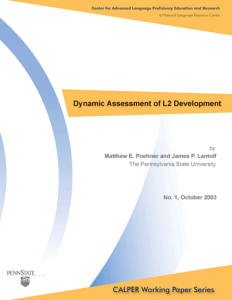
Publication Units:
Dynamic Assessment of L2 Development
Gender and Emotional Investment in Language Learning During Study Abroad
CALPER Working Paper Series, No. 2
This paper proposes a relatively nuanced account of the role of gendered activity as it shapes emotional investment in language learning during study abroad. The goal of the current paper is to propose a relatively nuanced account of the role of gendered activity as it shapes emotional investment in language learning during study abroad.
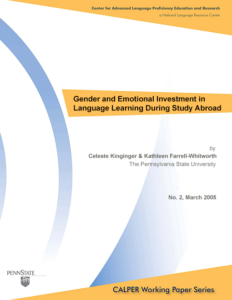
Publication Units:
Gender and Emotional Investment in Language Learning During Study Abroad
Internet-mediated Intercultural Foreign Language Education: Approaches, Pedagogy, and Research
CALPER Working Paper Series, No. 6
This working paper focuses on the use of Internet information and communication tools to support intercultural dialogue, debate, collaborative research, and less structured social interaction between (typically) internationally dispersed groups of learners who are members of different linguistic and cultural groups.
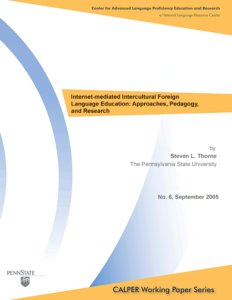
Publication Units:
Internet-mediated Intercultural Foreign Language Education: Approaches, Pedagogy, and Research
Internet-mediated Text and Multi-modal Expression in Foreign Language Education
CALPER Working Paper Series, No. 5
This paper provides a critical review of current trends in the use of technology in second and foreign language education. It also presents a preview that enumerates a number of nascent or near-future possibilities in this area. The authors aspire to provide a synaptic discussion of factors relevant to intermediate and advanced L2 learning mediated by communication technologies.
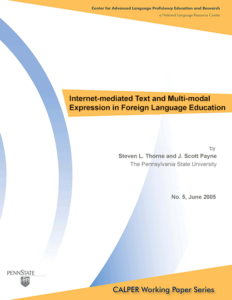
Publication Units:
Internet-mediated Text and Multi-modal Expression in Foreign Language Education
Language Proficiency or Symbolic Capability: A Dialectical Perspective
CALPER Working Paper Series, No. 9
A short position paper that argues for a dialectical perspective on language proficiency. Traditional approaches to language proficiency within applied linguistics are based on the dualistic perspective that has been inherited from psychology (Bakhurst, 1991) and that dominates the majority of research in SLA and language education.
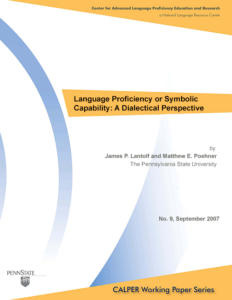
Publication Units:
Language Proficiency or Symbolic Capability: A Dialectical Perspective
Metaphor and Pedagogy
CALPER Working Paper Series, No. 11
In this working paper, the potential relevance of metaphor and metaphorical competence for L2 teaching and acquisition are outlined. The authors explain the main claims of conceptual metaphor theory, discuss structural components of conceptual metaphor and contrast conceptual metaphor and linguistic metaphor as two distinct phenomena and consider the two types of conceptual metaphor — primary and complex. Lastly, the authors present some ways of adapting conceptual metaphor for pedagogical purposes.
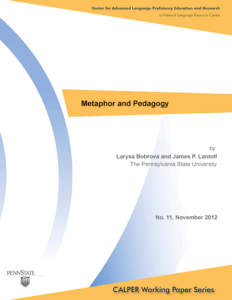
New Media Literacies, Online Gaming, and Language Education
CALPER Working Paper Series, No. 8
This paper describes second and foreign language uses of Internet communication tools, web environments, and online gaming, and critically reviews existing research and emerging technologies representing diverse pedagogical conditions in two main areas: (1) interaction in ongoing Internet-mediated environments that include popular culture blogs and web sites, fan fiction communities, language and/or culture communities; and (2) multi-user online games, including a case study of multilingual communication within a gaming environment.
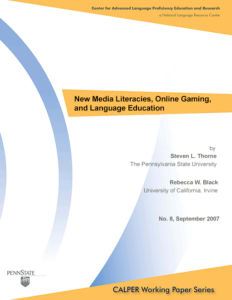
Publication Units:
New Media Literacies, Online Gaming, and Language Education
New Technologies and Additional Language Learning
CALPER Working Paper Series, No. 7
This working paper is a review essay in which the author discusses a number of contexts and uses of technologies, generally Internet communication technologies, as they have been and are being used in second and foreign language education environments. Three primary areas of research and pedagogical innovation are addressed, 1) the use of synchronous computer-mediated communication (CMC), 2) Internet-mediated intercultural L2 education, and 3) additional language learning as a function of participation in Internet-supported communicties such as online fora, fan sites, fan fiction sites, and online gaming.
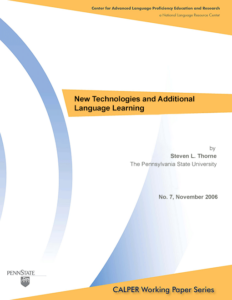
Publication Units:
New Technologies and Additional Language Learning